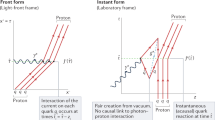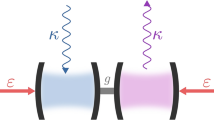Abstract
Hoyle and Narlikar1 (HN) have proposed a quantized version of the Wheeler–Feynman2,3 (WF) theory of classical electrodynamics. It is the purpose of this report to point out that the HN treatment of spontaneous emission deviates from the WF prescription. This is true even in the classical limit; however, in this limit the numerical effects of two different deviations cancel.
This is a preview of subscription content, access via your institution
Access options
Subscribe to this journal
Receive 51 print issues and online access
$199.00 per year
only $3.90 per issue
Buy this article
- Purchase on Springer Link
- Instant access to full article PDF
Prices may be subject to local taxes which are calculated during checkout
Similar content being viewed by others
References
Hoyle, F., and Narlikar, J. V., Ann. Phys., 54, 207 (1969).
Wheeler, J. A., and Feynman, R. P., Rev. Mod. Phys., 17, 157 (1945).
Wheeler, J. A., and Feynman, R. P., Rev. Mod. Phys., 21, 425 (1949).
Author information
Authors and Affiliations
Rights and permissions
About this article
Cite this article
KATZ, A., ORNAN, E. & SCHWARTZ, M. Hoyle–Narlikar Quantization of Wheeler–Feynman Electrodynamics. Nature 225, 534–535 (1970). https://doi.org/10.1038/225534a0
Received:
Issue Date:
DOI: https://doi.org/10.1038/225534a0
This article is cited by
-
Quantization of Wheeler-Feynman Electrodynamics
Nature (1970)
Comments
By submitting a comment you agree to abide by our Terms and Community Guidelines. If you find something abusive or that does not comply with our terms or guidelines please flag it as inappropriate.



